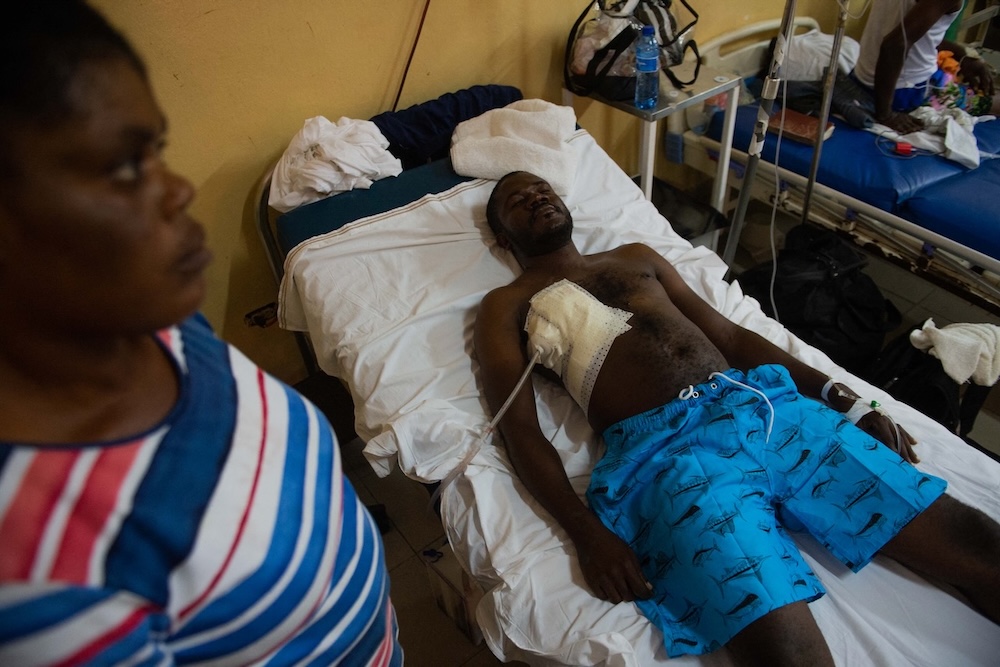December 2024 in the Americas: A free expression and civic space round-up produced by IFEX's Regional Editor Laura Vidal, based on IFEX member reports and news from the region.
The challenges in the region for 2025 emerged before the year began. In December, violence deepened in Haiti, while the aftermath of elections in Venezuela and the United States continued to reverberate. Meanwhile, in Cuba, journalists faced relentless repression, from forced exile to arbitrary detentions. In a year where risks to civil society loomed large, organisations remained steadfast, working tirelessly to denounce and confront these challenges, stay prepared, and strengthen their networks of solidarity.
Haiti: A new low for journalist safety
The precarious state of press freedom in Haiti reached a devastating low on 24 December, when gang members opened fire on a group of journalists covering the reopening of the Haitian State University Hospital (HUEH) in Port-au-Prince. The attack left two journalists, Markenzy Nathoux and Jimmy Jean, dead, and seven others wounded, including Petyon Robens, Réginald Baltazar, Miracle Velondie, and Florise Deronvil. A police officer was also killed. The assailants, reportedly members of the Viv Ansanm gang coalition, targeted the gathering, claiming responsibility via a video on social media, saying they had not authorised the reopening of the hospital.
Local and international organisations, including IFEX members the Committee to Protect Journalists (CPJ) and Reporters Without Borders (RSF), condemned the attack. CPJ called for justice, while RSF emphasised the urgent need for international support and the prioritisation of journalists’ safety in discussions to address Haiti’s ongoing crisis.
The attack was a tragic reminder of the extreme dangers facing media professionals in Haiti and it underscores the impunity and unchecked violence that have gripped the country. At least six journalists were killed in connection with their work in 2022, and the situation deteriorated further in 2024. Prime Minister Ariel Henry’s resignation in March of that year further destabilised the nation, leaving transitional authorities struggling to govern a capital dominated by criminal organisations, as armed gangs, emboldened by a near-total breakdown of the rule of law, targeted journalists with impunity.
Venezuela: The new electoral aftershock has a date
As the political crisis in Venezuela deepens, the country braces for 10 January, when the opposition, led by Edmundo González Urrutia, claims it will assume office – despite Urrutia’s forced exile after the contested elections in July 2024, and Maduro’s government’s threats to imprison him upon arrival.
Since the elections, the government has escalated its attacks on freedom of expression and civic spaces. According to IPYS Venezuela, state security forces – including SEBIN, PNB, GNB, and Plan República – were responsible for 131 press freedom violations in 2024.
The year-end IPYS report sheds light on how state-led aggression has created a hostile environment for the press, characterised by harassment, threats, and arbitrary detentions. Journalists have increasingly faced digital blockades and targeted violence. In this landscape, state narratives dominate while dissenting voices are forced to self-censor, leaving the public deprived of critical information. The disappearance of columnist and activist Jesús Armas on 10 December, reportedly at the hands of SEBIN operatives, epitomises the deepening repression. Later reports indicate that Armas was tortured and detained in clandestine facilities.
Compounding this, Venezuela’s government has passed a series of legal initiatives, including establishing 30,000 local judges “of communal peace” – who will operate outside of the official judicial system – and restrictive laws: the Financing of Non-Governmental Organizations and Non-Profit Organizations (Ley de Fiscalización); and more recently, in December, the Simón Bolívar Law Against the Imperialist Blockade and the Law on Oversight, Regulation.
The Office of the Special Rapporteur for Freedom of Expression, as well as IFEX members Espacio Público and IPYS Venezuela, have pointed out that these laws severely undermine freedom of expression and civic participation. The Simón Bolívar Law introduces severe penalties, including up to 30 years of imprisonment and disqualification from holding public office for up to 60 years, targeting individuals who express support for international sanctions imposed on Venezuela. It also allows for trials in absentia and the confiscation of assets from those accused of promoting or supporting these sanctions. According to Espacio Público, the Simón Bolívar law also grants the state sweeping control over public narratives, stifling debate on critical issues like international sanctions and government policies, under the guise of protecting national sovereignty.
United States: Lawsuits a harbinger of a very difficult presidential term for the press
Even before taking office, the new administration is pursuing an aggressive stance against the press. Legal assaults on ABC News, as well as The Des Moines Register and the poll expert J. Ann Selzer, are seen as a clear message for the media: this is what what will happen to those critical of the new government.
According to RSF, Trump’s recent settlement with ABC News demonstrates how his lawsuits don’t need to succeed in court to achieve their goal. The claim against ABC News ended in a settlement of $15 million, plus legal fees, over defamation claims (related to Trump being found “liable for rape” in March 2024). Disney, ABC’s parent company, reportedly settled out of fear of unfavourable jury outcomes in Florida, a state Trump carried by 13 points.
The lawsuit against The Des Moines Register and pollster J. Ann Selzer for a poll showing Vice President Kamala Harris leading in Iowa is another frightening example. The legal action accuses them of “brazen election interference”, alleging that Selzer violated the Iowa Consumer Fraud Act. Legal experts and spokespeople from the newspaper have noted that the claim lacks merit, as the law is designed to protect citizens from misleading advertising, something that cannot be applied to the media. The final outcome of the lawsuit is still to come, however Selzer has announced she will retire from election polling.
PEN America has expressed alarm at this trend. Tim Richardson, Program Director of Journalism and Disinformation at PEN America, warned: “This is not just about one or two cases – it’s a warning to the entire media industry and civil society.” He added that while major networks like ABC can absorb financial blows, smaller outlets will face existential threats, which could lead to self-censorship and fewer critical voices in an already struggling local media landscape.
Cuba: Journalists face detention, harassment, and forced exile
The Cuban government continues its systematic attacks on independent journalists, with recent cases highlighting the extent of repression. On 19 December, Henry Constantin Ferreiro, director of the independent media outlet La Hora, was arrested in Havana and released seven days later. This was not an isolated incident. ARTICLE 19 Mexico and Central America reports that he was subjected to at least seven attacks in 2023 alone, including three arbitrary arrests tied to key commemorative dates or international events. The aim of these systematic actions, as outlined in their report, Violentar, reinventar y resistir: el ejercicio de la libertad de expresión en Cuba, is not only to silence the victim, but to intimidate other critical voices within Cuba.
Meanwhile, journalist José Luis Tan Estrada was forced into exile after enduring months of harassment, intimidation, and threats. Tan Estrada attempted to leave Havana for Nicaragua on 25 December but was informed of his barred entry to the country. In an interview with Martí Noticias, Tan Estrada condemned Nicaragua’s complicity with the Cuban regime and its State Security forces. Eventually, he was able to leave Cuba and is now in Guyana, though only after further intimidation during his departure from Havana’s José Martí Airport.
Estrada faced at least nine documented aggressions in 2024, including arbitrary detentions, surveillance, and threats. He also experienced targeted acts of intimidation, such as patrols near his home, acts of repudiation [“actos de repudio” refers to acts of violence and or humiliation towards critics of the government] directed at his family, and a summons under Cuba’s restrictive new Social Communication Law, which came into force in October 2024.
New & Noteworthy
- The Inter-American Commission on Human Rights (IACHR) releases report on Venezuela: Venezuela: Serious Human Rights Violations Following the Elections, details the regime’s strategies to maintain power. The report highlights how tactics prevented free, fair elections and instilled fear in order to consolidate control.
- PEN America and partners launch journalist Safety helpline in the US: PEN America, alongside the Knight Election Hub and five journalist safety organisations, including CPJ and the International Women’s Media Foundation (IWMF), have launched a Journalist Safety Urgent Care helpline offering U.S. journalists one-on-one safety consultations for digital, physical, psychosocial, and legal concerns, such as doxxing, threats, and arrests.
- RSF releases report on journalist protection programs in Latin America: RSF analysed journalist protection mechanisms in Chile, Ecuador, Guatemala, Paraguay, and Peru, highlighting the growing dangers faced by journalists and reaffirming the urgent need for robust safeguards.



